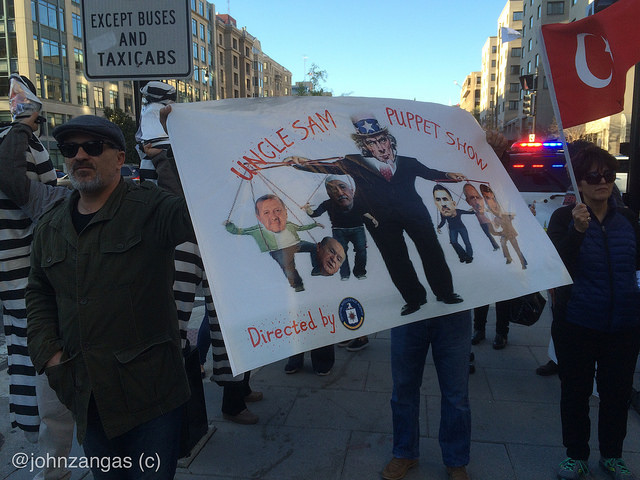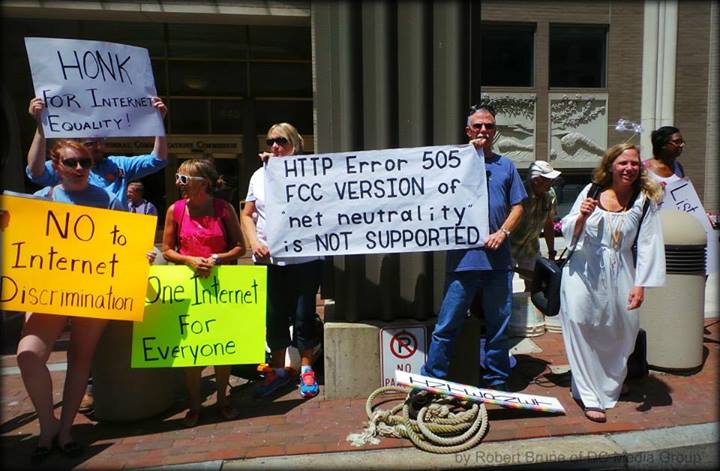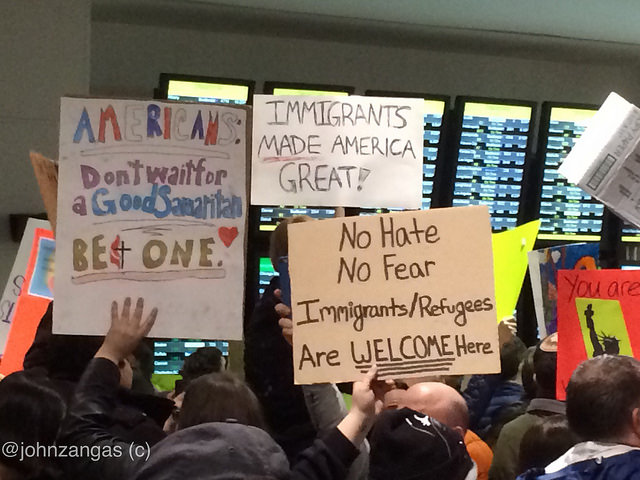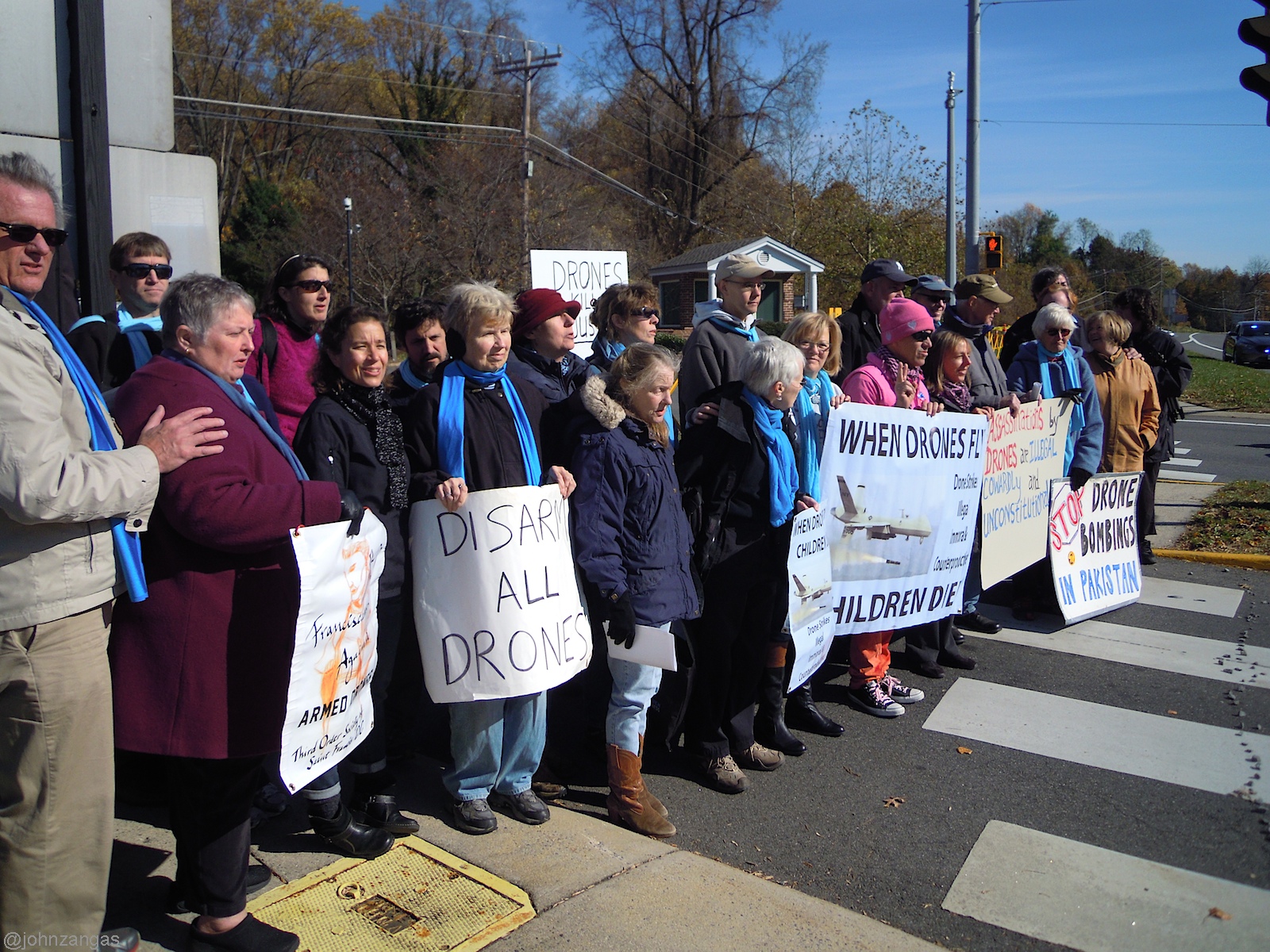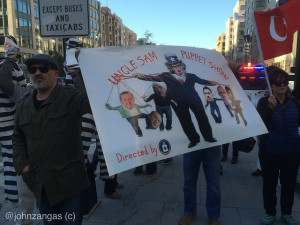
Washington, DC – Members of Turkish President Recep Erdogan’s security detail assaulted several journalists at the Brookings Institute in Washington, DC on Thursday. Erdogan was scheduled to give a speech about the state of Turkey in the early afternoon, when his security detail grabbed, struck, and forcibly removed journalists from the Institute. DC Metropolitan Police officers broke up several scuffles which ensued outside.
Adem Yavuz Arslan, a journalist with Özgür Düşünce, was pushed out of the building by Erdogan’s security detail, but Brookings Institute President, Strobe Talbot, and Communications Chief Gail Chalef intervened and escorted him back into the building for Erdogan’s speech. However, Erdogan’s security detail continued to threaten and insult him, according to Ali Halit Arslan, Washington correspondent with Zamen Newspaper.
Adem Arslan said that he was a “credentialed” journalist who had pre-registered for the event. Brookings staff told Erdogan’s security personnel he was a journalist who was welcomed at the Institute.
Video shows Erdogan’s security forces forcing Adem Arslan out of the building while another official strikes his left arm.
Arslan formerly worked for Zaman Newspaper, which was founded in Turkey in 1986 with offices in Istanbul and major capitals around the world. The newspaper published critical editorials of the Erdogan administration until March 4, when police raided the news office, fired its chief editor, and closed its website down for two days. It reopened as a pro-Erdogan publication on March 6.
A public policy scholar with the Wilson Center, Amberin Zaman, was also forced out the building by Erdogan’s security detail. She reported being called a “PKK Whore” by  Erdogan’s security detail.
Erdogan’s security detail.
Another Turkish journalist, Emre Uslu, was assaulted and unable to attend the speech. A photo published in Twitter depicted an injury to his leg.
National Press Club President Thomas Burr admonished President Erdogan for the assaults, and reminded him that there are certain constitutional rights the press enjoys in the U.S. and these rights must always be respected.
“Turkey’s leader and his security team are guests in the United States,” Burr said. “They have no right to lay their hands on reporters or protesters or anyone else for that matter, when the people they were apparently roughing up seemed to be merely doing their jobs or exercising the rights they have in this country.”
Erdogan’s security personnel also bullied protesters. They wrestled with them on the sidewalk outside the Brookings Institute, where they took several of their signs.
They also wrestled with protesters over an effigy of Erdogan, tearing it up, while assaulting the protesters, according to David Clark, a journalist who was present during the scuffles inside and outside on the street.
“One of the NPR reporters was trying to film the scene, and one of the security guards tried to kick his iPhone out of his hand at chest height. That was a pretty impressive kick,” said Clark. He said that DC police had to break up the fracas on the pavement outside.
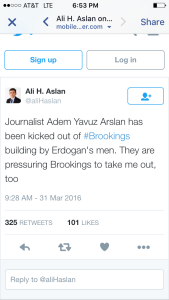 Clark also witnessed incidents involving Erdogan’s security detail removing journalists from inside Brookings Institute.
Clark also witnessed incidents involving Erdogan’s security detail removing journalists from inside Brookings Institute.
Members of the Turkish President’s delegation had already been recorded insulting and harassing Turkish Americans during an anti-Erdogan protest outside the St. Regis Hotel in Washington on Tuesday.
About two dozen of the delegation had gone outside the St. Regis Hotel where the protest was in progress, insulting and jeering at protesters. As protesters traded insults with them, tensions flared and DC police intervened, standing between sides and taping off access to the hotel. The St. Regis Hotel was effectively closed to access except for hundreds of Erdogon’s entourage consisting of delegates, press and his security police.
Across the street, about 50 supporters of Erdogan chanted and played music, attempting to drown out Tuesday protests. But as Erdogan left the hotel, protesters chanted for Erdogan to leave the U.S.
President Erdogan is visiting the U.S. as part of a 50 country summit on Nuclear Weapon Security taking place this week.
Protesters are expressing anger over his consolidation of power in the Turkish government, which has resulted in suppression of other political parties. But they also decried his military policies with Syria and Russia, which they say has exacerbated the refugee crisis while complicating diplomatic efforts to end conflict in the region.
While protesters exchanged words with PM Erdogan’s entourage, a man from the entourage photographed each protester. Another photographer video recorded the Anti-Erdogan protest.
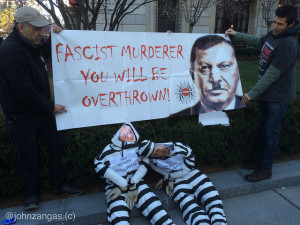
A protester named Hassan said Erdogan was a “huge disaster” for not only the Turkish people, and the Turkish Republic, but for the Syrian nation as well. “We have 2.5 million Syrians suffering because of the mistakes America and Erdogan made,” he said. “He has been using them as bargaining chips to get money from Europe,” said Hassan.
In November the European Union and Turkey entered an agreement in which Turkey will tighten its borders to Syrian Refugees in exchange for €3 billion in aid and a redux of accession talks for its entry to the EU. Turkish citizens will also be permitted to travel freely in the EU by October 2016.
Hassan said he was involved in the violent Gezi protests of 2013-14 against Erdogan’s crackdown on opposition parties in Turkey and hoped it would result in the return to an inclusive secular government. But it did not happen that way. Erdogan won the 2015 reelection, consolidating even more power.
While Turkish police have effectively silenced protests and dissent back at home, they are unable to do much to stop Turkish American dissent in the U.S.
Last month a visit by Erdogan to Ecuador resulted in his security detail beating up Anti-Erdogan protesters, created a diplomatic firestorm.
This is an opportunity to expose Erdogan’s fear of dissent, said a protester named Jihan, who would not give his last name. Jihan held a sign ridiculing Erdogan as a puppet in a show held by the U.S., with a footnote attributing the direction to the CIA.
This week the U.S. State Department warned U.S. citizens to leave Turkey because of a deteriorating political climate which they attributed to ISIS.

